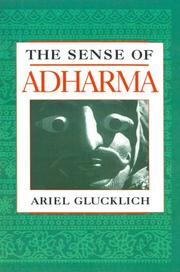| Listing 1 - 10 of 32 | << page >> |
Sort by
|
Book
ISBN: 1299462502 9814425427 9789814425421 9789814425414 9814425419 9781299462502 Year: 2013 Publisher: [Hackensack] N.J. : World Scientific,
Abstract | Keywords | Export | Availability | Bookmark
 Loading...
Loading...Choose an application
- Reference Manager
- EndNote
- RefWorks (Direct export to RefWorks)
This is a highly interdisciplinary book straddling physics and complex systems such as living organisms. The presentation is from the perspective of physics, in a manner accessible to those interested in scientific knowledge integrated within its socio-cultural and philosophical backgrounds. Two key areas of human understanding, namely physics and conscious complex systems, are presented in simple language. An optional technical presentation is also given in parallel where it is needed.
Physics --- Consciousness. --- Apperception --- Mind and body --- Perception --- Philosophy --- Psychology --- Spirit --- Self --- Philosophy. --- Dharma-wardana, Chandre --- Dharma-wardana, M. W. C. --- Wardana, Chandre Dharma --- -Dharma-wardana, C.
Book
ISBN: 1438465033 9781438465036 9781438465012 Year: 2017 Publisher: Albany, New York : State University of New York Press,
Abstract | Keywords | Export | Availability | Bookmark
 Loading...
Loading...Choose an application
- Reference Manager
- EndNote
- RefWorks (Direct export to RefWorks)
This book challenges two prevalent assumptions about the Mahābhārata: that its narrative is inherently incapable of achieving a conclusion and that its ending, the Svargārohaṇa parva, is an extraneous part of the text. While the exegetic traditions have largely tended to suppress, ignore, or overlook the importance of this final section, Shalom argues that the moment of the condemnation of dharma that occurs in the Svargārohaṇa parva, expressed by the epic protagonist, Yudhiṣṭhira, against his father, Dharma, is of crucial importance. It sheds light on the incessant preoccupation and intrinsic dismay towards the concept of dharma (the cardinal theme around which the epic revolves) expressed by Mahābhārata narrators throughout the epic, and is thus highly significant for understanding the Mahābhārata narrative as a whole.
Dharma. --- Mahābhārata --- Criticism, interpretation, etc.
Periodical
ISSN: 21968802 21968802 Year: 2013 Publisher: Dordrecht, Netherlands : London : Springer Science & Business Media, SpringerOpen
Abstract | Keywords | Export | Availability | Bookmark
 Loading...
Loading...Choose an application
- Reference Manager
- EndNote
- RefWorks (Direct export to RefWorks)
Hinduism --- Dharma --- Dharma. --- Hinduism. --- Religions --- Brahmanism --- Hindu law --- Hindu philosophy --- Adharma (Hinduism) --- Hindouisme

ISBN: 1280526890 0198024487 142940566X 9781429405669 9781280526893 9786610526895 6610526893 0195083415 9780195083415 0197741614 Year: 1994 Publisher: New York : Oxford University Press,
Abstract | Keywords | Export | Availability | Bookmark
 Loading...
Loading...Choose an application
- Reference Manager
- EndNote
- RefWorks (Direct export to RefWorks)
This is a study of the contrasting Hindu concepts of adharma (chaos) and dharma (order). The author uses a synthesis of phenomenological and anthropological approaches to study the structure of the imagination that produces such an apparently contradictory viewpoint.
Dharma. --- Adharma (Hinduism) --- Hindu symbolism. --- Hindu law --- Hindu philosophy --- Hinduism --- Symbolism --- Dharma
Book
ISBN: 9811624100 9811624097 Year: 2021 Publisher: Gateway East, Singapore : Springer,
Abstract | Keywords | Export | Availability | Bookmark
 Loading...
Loading...Choose an application
- Reference Manager
- EndNote
- RefWorks (Direct export to RefWorks)
Dharma (Buddhism) --- Buddhist teachings --- Dhamma (Buddhism) --- Buddhism --- Doctrines
Book
ISBN: 1476623503 9781476623504 9780786498093 0786498099 Year: 2016 Publisher: Jefferson, North Carolina : McFarland & Company, Inc., Publishers,
Abstract | Keywords | Export | Availability | Bookmark
 Loading...
Loading...Choose an application
- Reference Manager
- EndNote
- RefWorks (Direct export to RefWorks)
"Both Buddhism and dance invite the practitioner into present-moment embodiment. This collection of new essays documents the innovative work being done at the intersection of Buddhism and dance. The contributors--scholars, choreographers and Buddhist masters--discuss movement, performance, ritual and theory, among other topics. The final section provides a variety of guided practices"--
Dance --- Dharma (Buddhism) --- Movement therapy. --- Religious aspects --- Buddhism.
Book
ISBN: 0231179561 0231542151 9780231542159 9780231179560 Year: 2016 Publisher: New York: Columbia university press,
Abstract | Keywords | Export | Availability | Bookmark
 Loading...
Loading...Choose an application
- Reference Manager
- EndNote
- RefWorks (Direct export to RefWorks)
Whether defined by family, lineage, caste, professional or religious association, village, or region, India's diverse groups did settle on a concept of law in classical times. How did they reach this consensus? Was it based on religious grounds or a transcendent source of knowledge? Did it depend on time and place? And what apparatus did communities develop to ensure justice was done, verdicts were fair, and the guilty were punished?Addressing these questions and more, A Dharma Reader traces the definition, epistemology, procedure, and process of Indian law from the third century B.C.E. to the middle ages. Its breadth captures the centuries-long struggle by Indian thinkers to theorize law in a multiethnic and pluralist society. The volume includes new and accessible translations of key texts, notes that explain the significance and chronology of selections, and a comprehensive introduction that summarizes the development of various disciplines in intellectual-historical terms. It reconstructs the principal disputes of a given discipline, which not only clarifies the arguments but also relays the dynamism of the fight. For those seeking a richer understanding of the political and intellectual origins of a major twenty-first-century power, along with unique insight into the legal interactions among its many groups, this book offers exceptional detail, historical precision, and expository illumination.
Dharma --- Sanskrit literature --- Smṛti literature --- Indic literature --- Hindu law --- Hindu philosophy --- Hinduism --- Adharma (Hinduism) --- Dharma - Early works to 1800 --- Sanskrit literature - Translations into English
Book
ISBN: 9780300216196 030021619X 0300235232 9780300235234 Year: 2018 Publisher: New Haven, CT : Yale University Press,
Abstract | Keywords | Export | Availability | Bookmark
 Loading...
Loading...Choose an application
- Reference Manager
- EndNote
- RefWorks (Direct export to RefWorks)
An esteemed scholar of Hinduism presents a groundbreaking interpretation of ancient Indian texts and their historic influence on subversive resistance Ancient Hindu texts speak of the three aims of human life: dharma,artha, and kama. Translated, these might be called religion, politics, and pleasure, and each is held to be an essential requirement of a full life. Balance among the three is a goal not always met, however, and dharma has historically taken precedence over the other two qualities in Hindu life. Here, historian of religions Wendy Doniger offers a spirited and close reading of ancient Indian writings, unpacking a long but unrecognized history of opposition against dharma. Doniger argues that scientific disciplines (shastras) have offered lively and continuous criticism of dharma, or religion, over many centuries. She chronicles the tradition of veiled subversion, uncovers connections to key moments of resistance and voices of dissent throughout Indian history, and offers insights into the Indian theocracy's subversion of science by religion today.
Dharma. --- Hindu philosophy. --- Philosophy, Hindu --- Philosophy --- Philosophy, Indic --- Hindu law --- Hindu philosophy --- Hinduism --- Adharma (Hinduism)

ISBN: 1281923559 9786611923556 1590958845 9781590958841 159095887X 9781590958872 9781590958872 9781590958841 9781281923554 6611923551 Year: 2007 Publisher: Friendswood, TX : Total Recall,
Abstract | Keywords | Export | Availability | Bookmark
 Loading...
Loading...Choose an application
- Reference Manager
- EndNote
- RefWorks (Direct export to RefWorks)
Dharma. --- Hinduism --- Hindu law --- Hindu philosophy --- Adharma (Hinduism) --- Doctrines. --- India --- Religion.
Book
ISBN: 9780300216226 030021622X 9780300205183 030020518X 9780300224344 0300224346 Year: 2015 Publisher: New Haven, CT : Yale University Press,
Abstract | Keywords | Export | Availability | Bookmark
 Loading...
Loading...Choose an application
- Reference Manager
- EndNote
- RefWorks (Direct export to RefWorks)
Some twenty-five centuries after the Buddha started teaching, his message continues to inspire people across the globe, including those living in predominantly secular societies. What does it mean to adapt religious practices to secular contexts? Stephen Batchelor, an internationally known author and teacher, is committed to a secularized version of the Buddha's teachings. The time has come, he feels, to articulate a coherent ethical, contemplative, and philosophical vision of Buddhism for our age. After Buddhism, the culmination of four decades of study and practice in the Tibetan, Zen, and Theravada traditions, is his attempt to set the record straight about who the Buddha was and what he was trying to teach. Combining critical readings of the earliest canonical texts with narrative accounts of five members of the Buddha's inner circle, Batchelor depicts the Buddha as a pragmatic ethicist rather than a dogmatic metaphysician. He envisions Buddhism as a constantly evolving culture of awakening whose long survival is due to its capacity to reinvent itself and interact creatively with each society it encounters. This original and provocative book presents a new framework for understanding the remarkable spread of Buddhism in today's globalized world. It also reminds us of what was so startling about the Buddha's vision of human flourishing.
Dharma (Buddhism) --- Buddhism --- Buddhist doctrines --- Buddhist theology --- Lamaist doctrines --- Buddhist teachings --- Dhamma (Buddhism) --- Doctrines. --- Doctrines --- Buddha,
| Listing 1 - 10 of 32 | << page >> |
Sort by
|

 Search
Search Feedback
Feedback About UniCat
About UniCat  Help
Help News
News